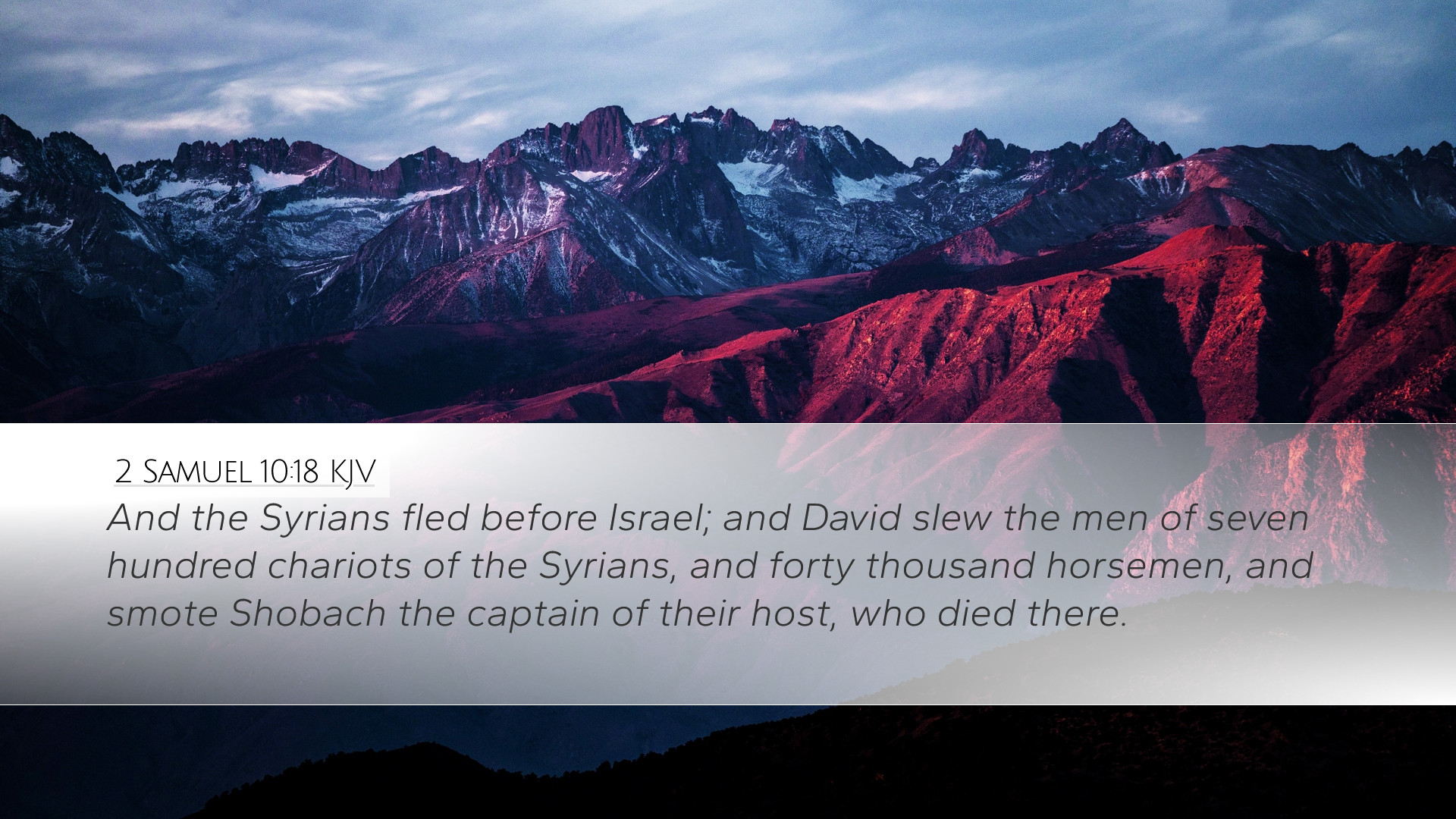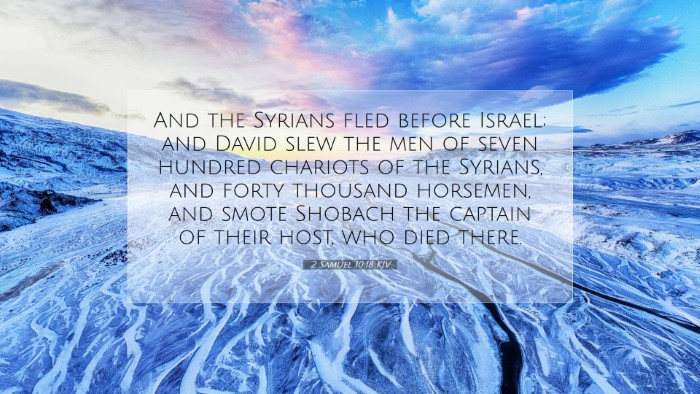Old Testament
Genesis Exodus Leviticus Numbers Deuteronomy Joshua Judges Ruth 1 Samuel 2 Samuel 1 Kings 2 Kings 1 Chronicles 2 Chronicles Ezra Nehemiah Esther Job Psalms Proverbs Ecclesiastes Song of Solomon Isaiah Jeremiah Lamentations Ezekiel Daniel Hosea Joel Amos Obadiah Jonah Micah Nahum Habakkuk Zephaniah Haggai Zechariah Malachi2 Samuel 10:18
2 Samuel 10:18 KJV
And the Syrians fled before Israel; and David slew the men of seven hundred chariots of the Syrians, and forty thousand horsemen, and smote Shobach the captain of their host, who died there.
2 Samuel 10:18 Bible Commentary
Commentary on 2 Samuel 10:18
2 Samuel 10:18 states, "And the Syrians fled before Israel; and David slew the men of seven hundred chariots of the Syrians, and forty thousand horsemen, and smote Shobach the captain of their host, that he died there." This verse concludes a significant military engagement and conveys numerous theological and historical insights.
Historical Context
David’s reign saw a constant threat from neighboring nations. This confrontation with the Syrians follows the ungrateful diplomat's murder of David's emissaries, showcasing the often turbulent relationships between the Israelite kingdom and surrounding nations. David responds not merely to the provocation but seeks to maintain his kingdom’s integrity and power.
Theological Significance
This verse encapsulates the theme of divine assistance in battle, reflecting the belief that God supports His chosen leaders who follow His commands. The victory is simultaneously a demonstration of God's sovereignty and an affirmation of David’s rightful leadership.
Commentary Insights
1. Matthew Henry's Perspective
Henry emphasizes the power of God in battles and the importance of a faithful leader. He notes that the fleeing of the Syrians symbolizes the judgment of the Lord upon those who oppose His anointed. The vast number of slain military units signifies a miraculous triumph, reinforcing the notion that success in warfare is contingent upon adherence to divine will.
2. Albert Barnes' Analysis
Barnes draws attention to the narrative style and the historical implications of such military successes for the nation of Israel. He suggests that the mention of the "seven hundred chariots" and "forty thousand horsemen" illustrates the magnitude of the threat posed by Syria and the subsequent divine intervention, which turned the tide of battle decisively in favor of Israel. Moreover, the death of Shobach, their commander, signified not just a military defeat, but a crucial loss of leadership for the opposing forces.
3. Adam Clarke's Observations
Clarke provides a detailed breakdown of the text, interpreting the numerical references symbolically. The large numbers represent not merely the scale of the Syrian army but also the overwhelming nature of God’s deliverance to His people. His commentaries emphasize the cause of this victory being deeply rooted in the righteousness pursued by David in his leadership. Clarke often highlights the integration of history and moral lessons, suggesting that God often allows overwhelming odds to showcase His power through weakness.
Practical Applications for Ministry
- God’s Sovereignty in Human Affairs: This passage reassures leaders and congregations that God remains sovereign, orchestrating the events of history for His purposes. It encourages believers to trust in God's plans during turbulent times.
- Leadership and Responsibility: David's actions provide a model for leadership that is grounded in reliance upon God and the pursuit of justice. Modern leaders can draw insights into how ethical governance overlaps with spiritual conviction.
- Victory through Faith: The depiction of victory despite insurmountable odds teaches that faith and divine support can lead to triumph. This principle can be empowering for believers facing personal or communal challenges.
Conclusion
2 Samuel 10:18 serves as a profound reminder of God's involvement in the affairs of nations and His unwavering support for those who are aligned with His purposes. The reflections from renowned commentators illuminate the importance of divine sovereignty, ethical leadership, and the hope that comes from faith. This verse is not only a historical account but also an enduring encouragement for faith and resilience in the face of adversity.


